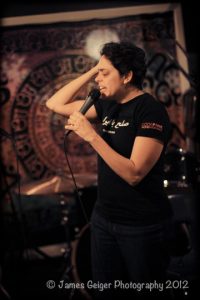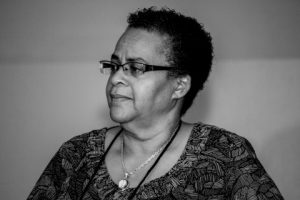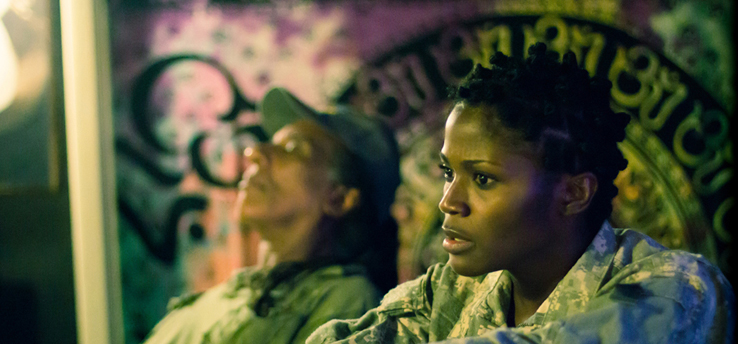Speed Killed My Cousin, The Carpetbag Theatre’s newest play, is a multimedia performance rooted in the story of an African American female soldier and her struggle with post-traumatic stress disorder upon her return home from Iraq. While driving down the L.I.E., she tries to talk with her father about his experience in the Vietnam War, and her cousin—a Vietnam veteran who died in car crash shortly after his return. She also remembers the women she left behind in Iraq, some of whom did not survive. Memories and scenes unfold before her, and in the rear-view mirror, as she’s driving. Ultimately she must decide whether to let go of the wheel, as her cousin did, or to choose life.
In conjunction with the play, we are developing a model of Creative Arts Reintegration (CAR), creating avenues for veterans to tell their stories, and for communities to better understand the challenges that veterans face in the process of returning home. We are working with service providers, peace activists, cultural workers and resource people who assist in the healing process with veterans and their families; with African American communities impacted by the traumas of war, disaster and violence; and with women who have been victimized by sexual violence.
Both the play Speed and the CAR process are about un-learning violence, as a society and as individuals. Theatre, Digital Storytelling, and deep community engagement are the methods by which we do this. They are also the practices that allow us to “release the demons that hold us hostage over time.”
The Impetus for this Work: Speed is Personal
Linda Parris-Bailey (Playwright): Speed is personal. It is a story that needed to find its place, the story that haunts, the story that won’t let go … It is the right time for the telling … I have long been trying to tell a story to which I had no access and no voice. War has been largely the story of men. The impact is, however, felt by us all. I discovered my voice, my way into the story of war’s impact, through a conversation with a young African American recruit. The recruit, a female 2000s version of my 1960s male cousin, was lost, unemployed and looking for a way out … Understanding the truth of the war experience can only be approached with those that have lived it. The secrets that have never been revealed by veterans of the Vietnam War keep those veterans haunted and un-healed. Can we afford a new generation of soldiers that cannot heal? Can we know what these soldiers will bring home to their families if we don’t hear their stories? Can we live with the increasing violence occurring in the families of veterans? It is necessary to speak. As artists, we have the responsibility to break the silence that destroyed so many returning vets and to bring healing to those who have considered suicide by sharing their stories … We search for understanding through story. The dialogue that we seek begins within the ensemble, moves outward into the community of returning veterans, and then outward to our communities and audiences, creating safe circles within which we can speak our true hearts and minds. This is the heart of our work. We seek change within us, change in our various communities and change in the world. Today, it seems possible.
Andrea Assaf (Director): I felt honored when Linda invited me to direct her extraordinary play, and to be a partner in developing these multi-layered partnerships that addresses what Dr. Martin Luther King, Jr. described in his 1967 speech “Beyond Vietnam: A Time to Break Silence” as the triple evils of Poverty, Racism and Militarism. (The true Axis of Evil, you might say.) Military recruitment disproportionately targets young people of color and working class families. As more and more soldiers return home, with lasting physical, emotional and psychological injuries, we must face the impact of our choices as a society, and confront what these “10 Years and Counting” of war and violence have done to us as a nation … The current wave of Islamophobia in the U.S. impacts both Arab Americans and African Americans, as well as anyone who “looks Muslim,” new immigrants targeted by racial profiling, and community activists experiencing the destruction of civil liberties under the Patriot Act and Homeland Security policies. This uncommon collaboration (between CBT, an African American theatre ensemble, and me, an Arab American theatre director) lays the foundation for dialogues and exchanges that can bring community members together across lines of identity and experience, to address the effects of war on our lives and souls. By engaging both African American and Arab American communities, both veterans and peace activists, both urban and rural communities—by working creatively across all these lines that so often divide us, through a poignant and moving story that focuses on women’s experience in war—we necessarily have to confront our assumptions, stereotypes, internalized oppressions, our learning curves and growing edges, in multiple and complex ways. And work together, toward reconciliation and healing. Exchanges such as these help us build new solidarities, new community connections, to help create what Arundhati Roy describes as that other world we know is possible, that we can hear breathing.
Community Collaborations: The C.A.R.
Since 1969, The Carpetbag Theatre Inc. has told stories of empowerment, celebrated African American culture, and revealed hidden histories. CBT serves communities by returning their stories to them with honesty, dignity, and concern for the aesthetic of that particular community. Through creativity, our work helps people break through the silences that oppress them.
Linda: I belong to a community of African American women. I belong to a community of cultural workers. I belong to a community of people who have been traumatized by slavery, racism, economic injustice and yes, war. Both personally and as a member of this community, I have experienced depression, and the vicarious trauma of sexual violence and military trauma. As I revisit these experiences through my work, what do I hope to accomplish and what are the goals of my communities and partners? What are the steps to healing? What are the action items? How do we deal with the multiple traumas caused by violence, poverty, racism (systemic and internalized), and war?
The lens through which I view my work is based on a statement that CBT developed in response to discussions around “aesthetics” and how Western European standards have been used to misunderstand and diminish the work of people of color. The statement includes the following:
We believe in the power of story to re-frame experiences and provide healing, and that in the act of telling we release the demons that hold us hostage over time.
We believe that good and valuable art changes our way of seeing.
In our research and interactions with service providers, what we have found to be overwhelmingly true is that women of color are not seeking or receiving assistance at a proportionate rate, particularly in the Southeastern and Appalachian regions. For example, research published in Psychological Magazine states, “When PTSD affects US race/ethnic minorities, it is usually untreated. Large disparities in treatment indicate a need for investment in accessible and culturally sensitive treatment options.” Our experience working with the local Veterans Center in Knoxville, and with support organizations nationally, reinforces that there is a need to reach out to military women and their families, to provide access to assistance and/or treatment, and that this begins with self-empowerment. As a community-based arts organization, we have repeatedly witnessed this form of transformative self-empowerment through our theatre work with other trauma victims.
As one of our partners, Rachel L. Brink (LCSW, BCD, CPRP), Chief of the Psychosocial Rehabilitation & Recovery Center (PRRC) at the James A. Haley VA Medical Center in Tampa, Florida wrote: “As a mental health provider, I have personally experienced the power of music and drama and the ability creative arts have to lift someone from depression, distract from auditory hallucinations or help someone escape from intrusive memories of past trauma … Personal story telling can be an extremely empowering and healing experience for individuals that have been fearful of sharing their circumstances with others.”
Escalating rates of suicide among active military service men and women, as well as veterans, and the crisis of domestic violence in military families, have only confirmed our belief that trauma and multiple forms of violence are inextricably linked. This program helps to remove the stigma of Post-traumatic Stress Disorder (PTSD) and Military Sexual Violence (MST), and helps break through the social taboos of talking about what soldiers face in the process of reintegration. The Speed the CAR project will draw attention to the impact of PTSD and other residuals of a multi-generational focus on warrior culture in our communities.
As one of our consultants, a Vietnam Veteran, said to us during the play’s creation, “The military is very good at teaching us how to kill; what they haven’t done is to teach how to stop killing.” The current climate calls for a response to violence that addresses it as the disease that it has become. If we can examine the process of un-learning violence, then there is hope for our young people, and our veterans and families.
Creating the Model: Why Tampa?
Andrea: Tampa is “CENTCOM”—Central Command for U.S. military operations in the Middle East, North Africa and Central Asia, most notably Iraq and Afghanistan. In addition to active military (approx. 50,000), the Department of Veterans Affairs (VA) states that the Tampa Bay has the largest concentration of veterans in the nation (over 340,000); and according to the Department of Defense, over 55,000 military retirees. All together, the military community is nearly 20% of our local population. In addition, the University of South Florida (USF)-Tampa is a major campus for veteran reintegration nationally. USF is also a major research institution for multiple traumas related to war, including PTSD and TBI (Traumatic Brain Injury). Tampa is also home to a major prosthetics company, a drone manufacturer, and an unemployment rate worse than the national average—which, of course, includes veterans, and tends to drive more young people into military service. Now add to that approximately 25,000 Muslim-identified individuals in our region, of over 30 nationalities, enormous Arab and Iranian communities, and an Iraqi and Syrian refugee community that is growing every day. Not to mention that the history of racism in the Tampa area is deep: the KKK was actually headquartered in Tampa until the 1990s. To this day, Florida has one of the more active Klans in the nation, and an enormous Confederate flag can be seen flying over one of our major highways.
In Tampa, Art2Action, Inc. is working in partnership with CBT on a multi-tiered, in-depth CAR model, which includes: (1) on-going creative arts workshops with the PRRC veterans drama group, focused on theatre skills, development of their original “Voices of Recovery” performance, and digital stories; (2) a monthly Veterans Open Mic, at Sacred Grounds Coffee House, co-sponsored by Veterans for Peace (VFP); (3) a residency with the Carpetbag Theatre ensemble at the University of South Florida (USF) in September-October 2013, focused on engaging student veterans, educators and service providers who work with veterans, including Story Circles. Our goal is to present the full production of Speed Killed My Cousin in Tampa for public audiences, with post-performance dialogues and guest speakers, to raise public awareness about the challenges veterans face, trauma and healing, in 2014. Through our partnerships with service providers, we are committed to having mental health clinicians and Veteran Peer Leaders available for support at all events.
Where’s the CAR Going?: Replicating the Model
We intend to develop the program in Tampa as a model that can be replicated in additional cities where the play will tour. Our contact at the national Department of Veterans Affairs has expressed that if our work in Tampa is recognized as successful at the local level, we may be able to develop a national partnership with the VA. With presenting partners in different regions, we would then be able to increase the impact of our work. For example, in New Orleans, our partner Junebug Productions will present Carpetbag Theatre for two weeks in November 2013, creating community opportunities to understand the effects of trauma, from Hurricane Katrina to the experience of war, and increasing access to the healing power of the arts. In addition, we are developing national partnerships with VFP and IVAW (Iraq Veterans Against the War). We are also interested in replicating this work in Philadelphia, San Francisco, Texas, and other places where there are large veteran communities and arts partners.
Want to bring “Speed” and the CAR to your community? Contact The Carpetbag Theatre, Inc.: www.carpetbagtheatre.org
For videos, music, interviews & more, please visit:
- Video Preview of Speed Killed My Cousin: http://vimeo.com/art2action/speedkilledmycousin
- Carpetbag Theatre LIVE! on The Blue Plate Special in Knoxville, featuring music from Speed Killed My Cousin: https://soundcloud.com/art2action/speed-killed-my-cousin
- Interview with Andrea Assaf, director of Speed Killed My Cousin, by veteran Anita Stewart on Wise Women Media: www.blogtalkradio.com/here-be-monsters/2013/08/17/wise-woman-media–anita-stewart
- Interview with actress Ashley Wilkerson, who plays Debra, the main character in Speed, by Samuel Thompson: http://samuelathompson.blogspot.com/2012/10/speed-killed-my-cousin-interview-with.html
 Andrea Assaf is a writer, performer, director and cultural organizer. She’s the founding Artistic Director of Art2Action Inc., and the National Coordinator of the Institute for Directing & Ensemble Creation (an Art2Action collaboration with Pangea World Theater). She’s also a consultant with the Arts & Democracy Project, and served as the National Coordinator for the SEIU Artists-in-Residence Program (2012). She is a former Artistic Director of New WORLD Theater (2004-09), and former Program Associate for Animating Democracy (2001-04). Andrea has a Masters degree in Performance Studies and a BFA in acting, both from NYU’s Tisch School of the Arts. Andrea serves on the Board of CAATA (Consortium of Asian American Theaters & Artists), the Executive Committee of Alternate ROOTS, and the International Management Committee of WPI (Women Playwrights International). She’s a member of RAWI (Radius of Arab American Writers).
Andrea Assaf is a writer, performer, director and cultural organizer. She’s the founding Artistic Director of Art2Action Inc., and the National Coordinator of the Institute for Directing & Ensemble Creation (an Art2Action collaboration with Pangea World Theater). She’s also a consultant with the Arts & Democracy Project, and served as the National Coordinator for the SEIU Artists-in-Residence Program (2012). She is a former Artistic Director of New WORLD Theater (2004-09), and former Program Associate for Animating Democracy (2001-04). Andrea has a Masters degree in Performance Studies and a BFA in acting, both from NYU’s Tisch School of the Arts. Andrea serves on the Board of CAATA (Consortium of Asian American Theaters & Artists), the Executive Committee of Alternate ROOTS, and the International Management Committee of WPI (Women Playwrights International). She’s a member of RAWI (Radius of Arab American Writers).
 Linda Parris-Bailey as the primary Writer-in-Residence for The Carpetbag Theatre Ensemble (CBT), has written numerous touring works for Carpetbag and several commissioned works for other national theater companies. Her published works can be found in several anthologies including Alternate ROOTS; Plays from the Southern Theater; Ensemble Works! Monologues for Actors of Color; High Performance and Breathing the Air. She has served on the planning committee of The International Women Playwrights Conferences in Greece and the Philippines, and her work was performed at the WPI conference in Australia. As a cultural worker, Parris-Bailey has worked in communities throughout the United States including residencies for the W.K. Kellogg Foundation and New World Theater. She has been the recipient of the Otto Award for Political Theater, Circle of Change Award and Artist of the Year.
Linda Parris-Bailey as the primary Writer-in-Residence for The Carpetbag Theatre Ensemble (CBT), has written numerous touring works for Carpetbag and several commissioned works for other national theater companies. Her published works can be found in several anthologies including Alternate ROOTS; Plays from the Southern Theater; Ensemble Works! Monologues for Actors of Color; High Performance and Breathing the Air. She has served on the planning committee of The International Women Playwrights Conferences in Greece and the Philippines, and her work was performed at the WPI conference in Australia. As a cultural worker, Parris-Bailey has worked in communities throughout the United States including residencies for the W.K. Kellogg Foundation and New World Theater. She has been the recipient of the Otto Award for Political Theater, Circle of Change Award and Artist of the Year.

